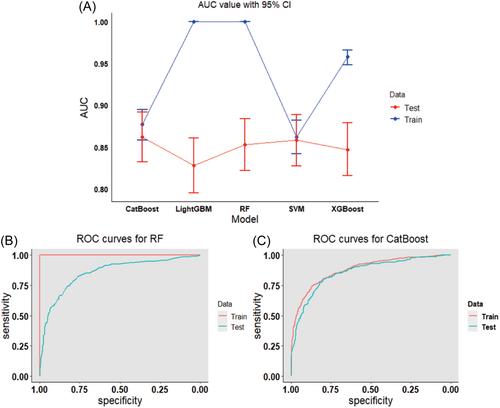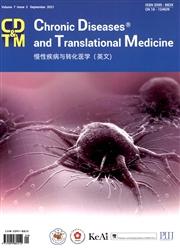Association of cardiorenal biomarkers with mortality in metabolic syndrome patients: A prospective cohort study from NHANES
Abstract
Objectives
Approximately 20%–25% of the global adult population is affected by metabolic syndrome (MetS), highlighting its status as a major public health concern. This study aims to investigate the predictive value of cardiorenal biomarkers on mortality among patients with MetS, thus optimizing treatment strategies.
Methods
Utilizing data from the National Health and Nutrition Examination Survey (NHANES) cycles between 1999 and 2004, we conducted a prospective cohort study involving 2369 participants diagnosed with MetS. We evaluated the association of cardiac and renal biomarkers with all-cause and cardiovascular disease (CVD) mortality, employing weighted Cox proportional hazards models. Furthermore, machine learning models were used to predict mortality outcomes based on these biomarkers.
Results
Among 2369 participants in the study cohort, over a median follow-up period of 17.1 years, 774 (32.67%) participants died, including 260 (10.98%) from CVD. The highest quartiles of cardiac biomarkers (N-terminal pro-B-type natriuretic peptide [NT-proBNP]) and renal biomarkers (beta-2 microglobulin, [β2M]) were significantly associated with increased risks of all-cause mortality (hazard ratios [HRs] ranging from 1.94 to 2.06) and CVD mortality (HRs up to 2.86), after adjusting for confounders. Additionally, a U-shaped association was observed between high-sensitivity cardiac troponin T (Hs-cTnT), creatinine (Cr), and all-cause mortality in patients with MetS. Machine learning analyses identified Hs-cTnT, NT-proBNP, and β2M as important predictors of mortality, with the CatBoost model showing superior performance (area under the curve [AUC] = 0.904).
Conclusion
Cardiac and renal biomarkers are significant predictors of mortality in MetS patients, with Hs-cTnT, NT-proBNP, and β2M emerging as crucial indicators. Further research is needed to explore intervention strategies targeting these biomarkers to improve clinical outcomes.


 求助内容:
求助内容: 应助结果提醒方式:
应助结果提醒方式:


